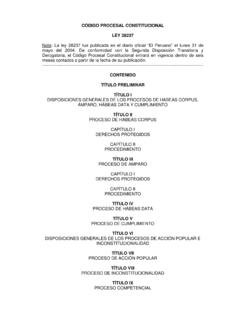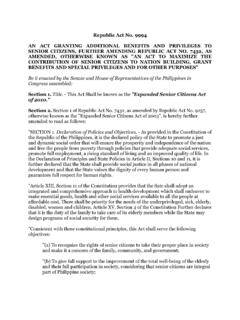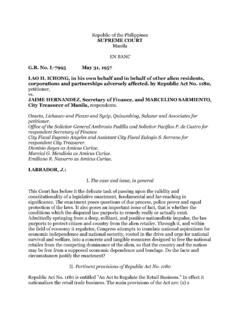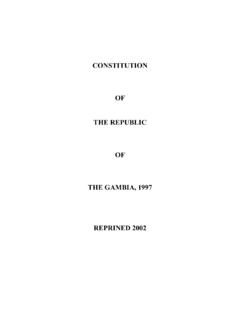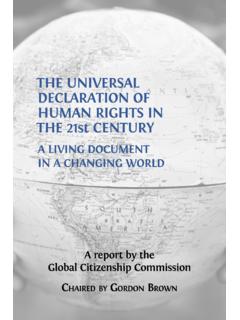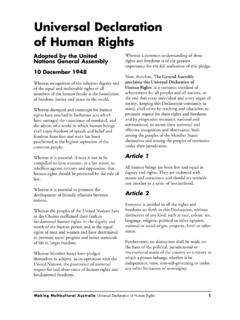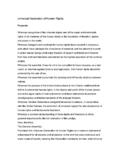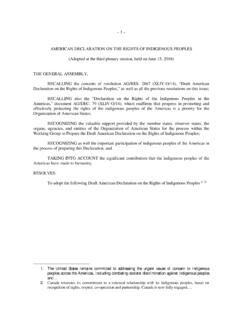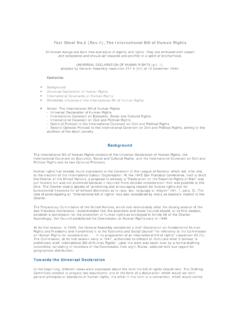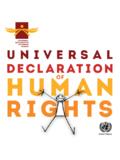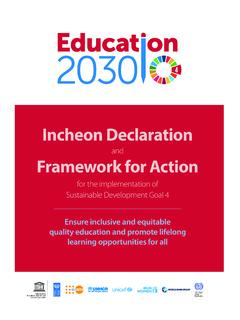Transcription of 1- THE 1987 PHILIPPINE CONSTITUTION - Human Rights …
1 THE 1987 CONSTITUTION OF THE REPUBLIC OF THE PHILIPPINES PREAMBLE We, the sovereign Filipino people, imploring the aid of Almighty God, in order to build a just and humane society, and establish a Government that shall embody our ideals and aspirations, promote the common good, conserve and develop our patrimony, and secure to ourselves and our posterity, the blessings of independence and democracy under the rule of law and a regime of truth, justice, freedom, love, equality, and peace, do ordain and promulgate this CONSTITUTION . ARTICLE I NATIONAL TERRITORY The national territory comprises the PHILIPPINE archipelago, with all the islands and waters embraced therein, and all other territories over which the Philippines has sovereignty or jurisdiction, consisting of its terrestrial, fluvial and aerial domains, including its territorial sea, the seabed, the subsoil, the insular shelves, and other submarine areas.
2 The waters around, between, and connecting the islands of the archipelago, regardless of their breadth and dimensions, form part of the internal waters of the Philippines. ARTICLE II declaration OF PRINCIPLES AND STATE POLICIES PRINCIPLES Section 1. The Philippines is a democratic and republican State. Sovereignty resides in the people and all government authority emanates from them. Section 2. The Philippines renounces war as an instrument of national policy, adopts the generally accepted principles of international law as part of the law of the land and adheres to the policy of peace, equality, justice, freedom, cooperation, and amity with all nations. Section 3. Civilian authority is, at all times, supreme over the military. The Armed Forces of the Philippines is the protector of the people and the State. Its goal is to secure the sovereignty of the State and the integrity of the national territory.
3 Section 4. The prime duty of the Government is to serve and protect the people. The Government may call upon the people to defend the State and, in the fulfillment thereof, all citizens may be required, under conditions provided by law, to render personal, military or civil service. Section 5. The maintenance of peace and order, the protection of life, liberty, and property, and promotion of the general welfare are essential for the enjoyment by all the people of the blessings of democracy. Section 6. The separation of Church and State shall be inviolable. STATE POLICIES Section 7. The State shall pursue an independent foreign policy. In its relations with other states, the paramount consideration shall be national sovereignty, territorial integrity, national interest, and the right to self-determination.
4 Section 8. The Philippines, consistent with the national interest, adopts and pursues a policy of freedom from nuclear weapons in its territory. Section 9. The State shall promote a just and dynamic social order that will ensure the prosperity and independence of the nation and free the people from poverty through policies that provide adequate social services, promote full employment, a rising standard of living, and an improved quality of life for all. Section 10. The State shall promote social justice in all phases of national development. Section 11. The State values the dignity of every Human person and guarantees full respect for Human Rights . Section 12. The State recognizes the sanctity of family life and shall protect and strengthen the family as a basic autonomous social institution. It shall equally protect the life of the mother and the life of the unborn from conception.
5 The natural and primary right and duty of parents in the rearing of the youth for civic efficiency and the development of moral character shall receive the support of the Government. Section 13. The State recognizes the vital role of the youth in nation-building and shall promote and protect their physical, moral, spiritual, intellectual, and social well-being. It shall inculcate in the youth patriotism and nationalism, and encourage their involvement in public and civic affairs. Section 14. The State recognizes the role of women in nation-building, and shall ensure the fundamental equality before the law of women and men. Section 15. The State shall protect and promote the right to health of the people and instill health consciousness among them. Section 16. The State shall protect and advance the right of the people to a balanced and healthful ecology in accord with the rhythm and harmony of nature.
6 Section 17. The State shall give priority to education, science and technology, arts, culture, and sports to foster patriotism and nationalism, accelerate social progress, and promote total Human liberation and development. Section 18. The State affirms labor as a primary social economic force. It shall protect the Rights of workers and promote their welfare. Section 19. The State shall develop a self-reliant and independent national economy effectively controlled by Filipinos. Section 20. The State recognizes the indispensable role of the private sector, encourages private enterprise, and provides incentives to needed investments. Section 21. The State shall promote comprehensive rural development and agrarian reform. Section 22. The State recognizes and promotes the Rights of indigenous cultural communities within the framework of national unity and development.
7 Section 23. The State shall encourage non-governmental, community-based, or sectoral organizations that promote the welfare of the nation. Section 24. The State recognizes the vital role of communication and information in nation-building. Section 25. The State shall ensure the autonomy of local governments. Section 26. The State shall guarantee equal access to opportunities for public service and prohibit political dynasties as may be defined by law. Section 27. The State shall maintain honesty and integrity in the public service and take positive and effective measures against graft and corruption. Section 28. Subject to reasonable conditions prescribed by law, the State adopts and implements a policy of full public disclosure of all its transactions involving public interest. ARTICLE III BILL OF Rights Section 1.
8 No person shall be deprived of life, liberty, or property without due process of law, nor shall any person be denied the equal protection of the laws. Section 2. The right of the people to be secure in their persons, houses, papers, and effects against unreasonable searches and seizures of whatever nature and for any purpose shall be inviolable, and no search warrant or warrant of arrest shall issue except upon probable cause to be determined personally by the judge after examination under oath or affirmation of the complainant and the witnesses he may produce, and particularly describing the place to be searched and the persons or things to be seized. Section 3. (1) The privacy of communication and correspondence shall be inviolable except upon lawful order of the court, or when public safety or order requires otherwise, as prescribed by law.
9 (2) Any evidence obtained in violation of this or the preceding section shall be inadmissible for any purpose in any proceeding. Section 4. No law shall be passed abridging the freedom of speech, of expression, or of the press, or the right of the people peaceably to assemble and petition the government for redress of grievances. Section 5. No law shall be made respecting an establishment of religion, or prohibiting the free exercise thereof. The free exercise and enjoyment of religious profession and worship, without discrimination or preference, shall forever be allowed. No religious test shall be required for the exercise of civil or political Rights . Section 6. The liberty of abode and of changing the same within the limits prescribed by law shall not be impaired except upon lawful order of the court. Neither shall the right to travel be impaired except in the interest of national security, public safety, or public health, as may be provided by law.
10 Section 7. The right of the people to information on matters of public concern shall be recognized. Access to official records, and to documents and papers pertaining to official acts, transactions, or decisions, as well as to government research data used as basis for policy development, shall be afforded the citizen, subject to such limitations as may be provided by law. Section 8. The right of the people, including those employed in the public and private sectors, to form unions, associations, or societies for purposes not contrary to law shall not be abridged. Section 9. Private property shall not be taken for public use without just compensation. Section 10. No law impairing the obligation of contracts shall be passed. Section 11. Free access to the courts and quasi-judicial bodies and adequate legal assistance shall not be denied to any person by reason of poverty.
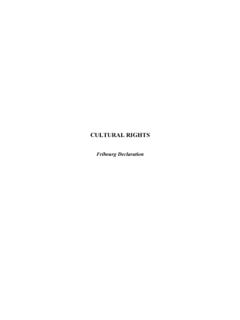
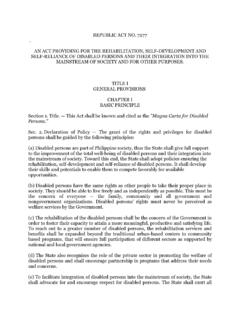
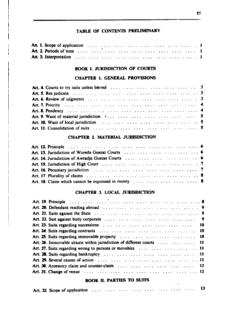
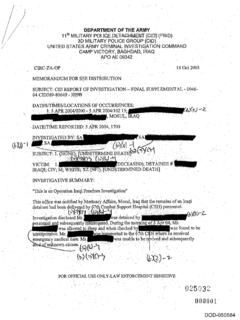
![Cap. 23] CHILDREN AND YOUNG PERSONS](/cache/preview/a/e/5/4/4/e/e/6/thumb-ae544ee647db019dff09ed2c401367af.jpg)
